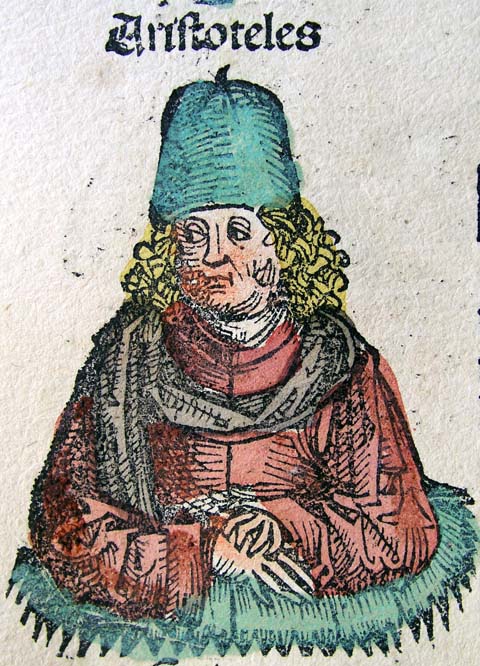

Aristotle divides the topics of his investigations into two broad categories:
the theoretical and the practical. Theoretical topics include such topics as metaphysics, natural
philosophy, psychology and astronomy. Practical topics include ethics and politics as well as rhetoric
and poetics. In addition, and outside of this classificational scheme, Aristotle devoted enormous attention
to the study of scientific method. This introduction to Aristotle's work will thus be divided into 3 parts:

Several of the fields of study that I am calling "sciences" here would not generally be considered sciences in the modern sense of the term: Certainly metaphysics, ethics, and poetics are no longer viewed as sciences. For Aristotle, however, ethics and metaphysics are no less sciences than biology or "natural philosophy," the area of study from which our sciences of chemistry and physics grew. While we tend to assume today that metaphysics is speculative and physics valid in light of empirical verification, these bodies of knowledge are for Aristotle both equally topics of scientific investigation. In fact, Aristotle views metaphysics in much the way we now think of theoretical physics. For him, metaphysics is simply a more generalized version of physics that examines the basic relationships between matter and the various forms it may exhibit, between substances and their various attributes.
Moreover, Aristotle is the first thinker to investigate thoroughly the methods by virtue of which the physical sciences can make verifiable claims. And he can perhaps be forgiven for not immediately producing the more modern scientific methods developed since the Renaissance. Aristotle's scientific methodology has more to do with logic. An oversimplification of his scientific method would read something like this: Proceeding from verifiably true premises, conclusions made according to the rules of logic are what make up a scientific body of knowledge. This method applies equally in astronomy, natural philosophy, biology, and metaphysics.
Aristotle does, however, draw an important distinction between the "more exact" theoretical sciences and the "less exact" practical sciences. He does think that ethics and politics can arrive at valid assertions. But he thinks that the truths of the practical sciences admit of exceptions and will only be true as a general rule. Moreover, life experience is required in order to recognize the truths of the practical sciences.